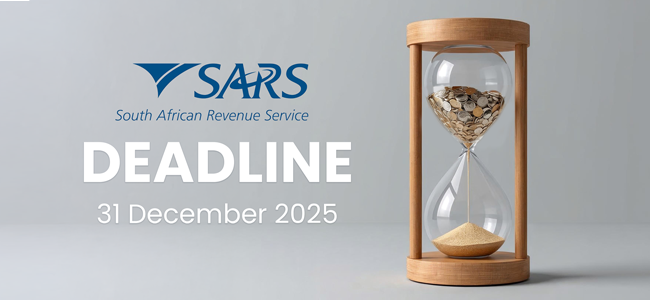“The South African Revenue Service is always ready to assist taxpayers to fulfil their legal obligations.” (SARS)
Acknowledging that taxpayers often find it difficult to settle tax debt due to financial challenges, SARS has launched an expedited debt compromise process to help eligible taxpayers settle outstanding tax debts swiftly and on more favourable terms.
The normal debt compromise process remains available to all taxpayers, and learnings from this expedited process will be used to enhance the broader system.
What is a debt compromise?
A compromise is a written agreement between SARS and a taxpayer in which SARS agrees to accept a reduced amount as full and final settlement of a tax debt.
Once the taxpayer pays the agreed amount and complies with the terms, SARS waives the balance of the debt. However, if the taxpayer defaults or fails to remain compliant, SARS can reinstate the full debt.
Expedited debt compromise eligibility criteria
- The process applies to non-disputed tax debts older than 12 months.
- You must be a client of a registered tax practitioner.
- Your tax returns must be up to date (even if payment is outstanding).
- The following exclusions apply: entities subject to specific legal processes (such as liquidations, estates, and business rescue cases), companies that are deregistered, cases subject to criminal investigation and audit, as well as cases within the write-off process, taxpayers who have had a compromise in the past three years, and taxpayers who have the means to pay but refuse to do so.
Submission requirements
Taxpayers applying for the expedited tax debt compromise process must provide comprehensive relevant supporting documentation with their applications, which must be submitted by 31 December 2025.
These documents include:
- Latest Annual Financial Statements (not older than one year)
- Last six months’ bank statements
- Cashflow forecast for 12 months
- List of Assets and Liabilities at market value
- Debtors’ age analysis
- Details of any connected persons
- Details of assets disposed of in the last three years
- Disclosure of future or contingent interests in assets
- Details of assets under the taxpayer’s control (including through trusts)
- Current and projected income for the next three years
- Application letter with clear motivation, including the proposed settlement offer amount, and the source of funds to pay the offered amount
- Collection Information Statement (CIS) request with reasons and proof to compromise the debt.
It is important that disclosures are accurate – if they aren’t SARS might not even consider the application.
SARS has committed to resolving qualifying applications within four weeks, using dedicated teams and enhanced workflow management.
Approved compromise settlements may be paid either in full (once-off payment), or in instalments as agreed by SARS.
Act now to avoid escalation
From 1 January 2026, SARS will escalate enforcement against taxpayers who remain non-compliant and have not applied for compromise. Such enforcement may include civil judgments against the taxpayer, writs of execution, collection of money from third parties such as banks, attachment of taxpayer assets, holding directors or members personally liable for the debt, sequestration or liquidation of the taxpayer, or preservation of assets against the debt. To support this intensified enforcement, SARS is engaging 260 legal collectors and 30 legal practitioners.
If you are struggling with long-overdue tax debt, this expedited tax debt compromise process may offer your best chance to finally resolve it – on favourable terms, nogal.
Contact us without delay, as applications close on 31 December 2025 and can only be submitted by registered tax practitioners.
Disclaimer: The information provided herein should not be used or relied on as professional advice. No liability can be accepted for any errors or omissions nor for any loss or damage arising from reliance upon any information herein. Always contact us for specific and detailed advice.
© AccountingDotNews

